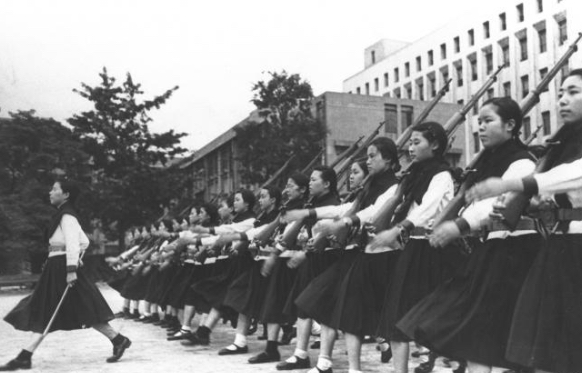shijitu「史実を世界に発信」
【概説】「史実を世界に発信する会」 茂木弘道
『大東亜戦争への道』(展転社)
中村 粲
その11 第三章 第四節 日露戦争:国運賭した日露の死闘
満韓に対するロシアの侵略意図が疑いなきものとなった1903(明治36)年8月、我国は遂に対露直接談判を開くに至りました。談判は、翌年1月まで5か月に及びました。
我国の主張の骨子は
(1)清韓両国の独立と領土保全を尊重し、両国における通商上の機会均等を相互に約す。
(2)ロシアは韓国での日本の優越した利益を、日本は満洲の鉄道に関するロシアの特殊利益を承認する。
(3)韓国の改革と善政のための助言と援助(軍事援助を含む)を与えるのは日本の専権であることをロシアは承認する。
というもので、ロシアが承諾し難い条項は一つもありませんでした。ロシアの対案は
(1)韓国の独立と領土保全の尊重は相互に約するも、満州は日本の利益範囲外なので交渉の対象にしないこと。
(2)日本の対韓援助は軍事以外とし、日本は韓国領土を軍略目的で使用しないこと。
(3)韓国の北緯39度以北を中立地帯とすること。
と、満州の独立と領土保全は交渉外として触れず、日本が韓国に派兵することを禁止し、さらに韓国北部を中立化することによって、満州におけるロシアの自由行動を安全ならしめんとする何とも虫のいい要求でした。
さらに、極東ロシア軍には動員令を下し、満州には戒厳令を布くなど急ピッチで戦争準備を進めていったのです。
1904年1月13日我国は最終提案を行うも、ロシア側は回答を寄せることなく戦争準備を進めるばかりでした。空しく回答を待つこと3週間、我が国は遂に2月4日対露断交と開戦を決意し、2月6日国交断絶を通告しました。
戦前の予想を覆す日本軍の陸海における戦勝が続きました。
・遼陽・沙河戦の勝利:ロシア軍を奉天に後退させる。
・海上権の獲得:敵艦隊を旅順に閉塞、ウジオストックの敵艦隊を抑え込む。
・旅順の陥落:旅順要塞を陥落させるとともに、艦隊を壊滅させる。
・奉天占領:陸の決戦、ロシア軍、死傷10万、捕虜4万の敗北。
・日本海海戦:津島沖にバルチック艦隊を撃滅:撃沈21隻、損傷自沈5
隻、抑留6隻という完全勝利。日本艦隊は水雷艇3隻を失うのみ。
米大統領ルーズベルトの斡旋によるポーツマス講和会議:講和条件は:
・露国は、日本が韓国で政治、軍事、経済上の卓絶した利益を有し、かつ必
要な指導、保護、監理を行う権利を承認す。
・両国は18か月以内に満洲より撤兵す。
・露国は遼東半島租借権を日本に譲渡す。両国は清国の承諾得ること。
・露国は東支鉄道南満州支線を付属の炭鉱とともに日本に譲渡す。
・露国は北緯50度以南の樺太を日本に譲渡す。
・その11,第3章4節 日本語原文: http://hassin.org/01/wp-content/uploads/Road11.pdf
・ 〃 第3章4節 英訳文:https://www.sdh-fact.com/CL/Road11E.pdf
令和5年3月6日
「史実を世界に発信する会」 会長 茂木弘道
協力者代表:神奈川大学教授 小山和伸
*拡散大歓迎
THE ROAD TO THE GREATER EAST ASIAN WAR
Nakamura Akira, Dokkyo University Professor Emeritus
(English Translation: Society for the Dissemination of Historical Fact)
Part 11, Chapter 3: The Russo-Japanese War-4
In August 1903 it became obvious that Russia had designs on both Manchuria and Korea. Therefore, Japan opened negotiations, which lasted for five months, until January of 1904, with Russia. The essentials of Japan’s requests of Russia were as follows.
(1) Russia must respect the independence and territorial integrity of China and Korea, and agree to equal commercial opportunity for Japan and Russia in both nations.
(2) Russia must recognize the supremacy of Japanese interests in Korea, and Japan must recognize Russian special interests relating to railways in Manchuria.
(3) Russia must recognize the fact that Japan has the exclusive right to offer advice about reforms and good government, and provide assistance (including military assistance) to Korea.
Russia had no good reason to object to those requests. Nevertheless, they responded with counterproposals, as shown below.
(1) Russia respects the territorial integrity of Korea. However, Russia will not negotiate about Manchuria, as it is not within the Japanese sphere of influence.
(2) Russia recognizes Japanese assistance to Korea only if such assistance is not military; Japan may not use Korean territory for strategic purposes.
(3) Korean territory north of the 39thparallel should be considered a neutral zone.
By refusing to negotiate about the independence and territorial integrity of Manchuria, by prohibiting Japan from sending troops to Korea, and furthermore, by creating a neutral zone in northern Korea, the Russians were assuming that they had free rein in Manchuria.
Moreover, during the negotiations, the Russians were frantically preparing for war, issuing mobilization orders to their troops in the Far East and imposing martial law in Manchuria.
On January 13, 1904, the Japanese submitted their final proposal to Russia. Even after three weeks, there was no reply from the Russians. On February 4, the Japanese notified Russians that they were breaking off diplomatic relations.
Hostilities commenced, with Japan’s winning consecutive victories both on land and sea, contrary to expectations.
(1) Battles of Liaoyang and Shahe: Japanese armies pushed the Russians northward to Mukden.
(2) Japan achieves maritime control: Japan contained Russian fleets at Port Arthur and Vladivostok.
(3) Fall of Port Arthur: The Japanese occupied the Port Arthur fortress and destroyed Russian ships.
(4) Occupation of Mukden: A decisive land battle was fought during which the Russians suffered 100,000 casualties and had 40,000 of their troops taken prisoner.
(5) Battle of Tsushima: The Japanese Navy obliterated the Baltic Fleet. Out of 38 Russian vessels, the Japanese sank 21 and damaged five others, which eventually sank; six were detained in neutral ports. Japan lost only three torpedo boats.
US President Roosevelt arranged for peace talks; the Portsmouth Treaty was signed on September 5, 1905. Terms were as follows:
(1) Russia acknowledges that Japan possesses paramount political, military, and economic interests in Korea, and has the right to take measures it deems necessary for guidance, protection, and control in that nation.
(2) Both nations shall remove their troops from Manchuria within 18 months.
(3) Russia assigns the lease of Liaodong peninsula to Japan, with the consent of the government of China.
(4) Russia transfers the South Manchuria Branch line (between Changchun and Port Arthur) of the Chinese Eastern Railway, together with pertaining coal mines, to Japan.
(5) Russia assigns the portion of Sakhalin south of the 50th degree of north latitude to Japan.
URL: https://www.sdh-fact.com/book-article/2034/
PDF: https://www.sdh-fact.com/CL/Road11E.pdf
MOTEKI Hiromichi, Chairman
Society for the Dissemination of Historical Fact
Phone: 81-3-3519-4366
Fax: 81-3-3519-4267
Email: moteki-sdh-fact.com
URL: http//www.sdh-fact.com
Note: Japanese names are rendered surname first in accordance with Japanese custom.

